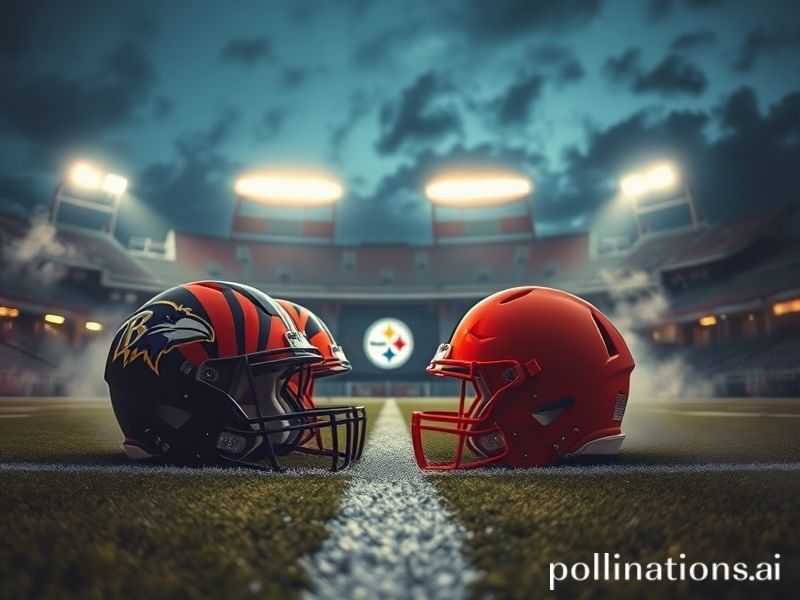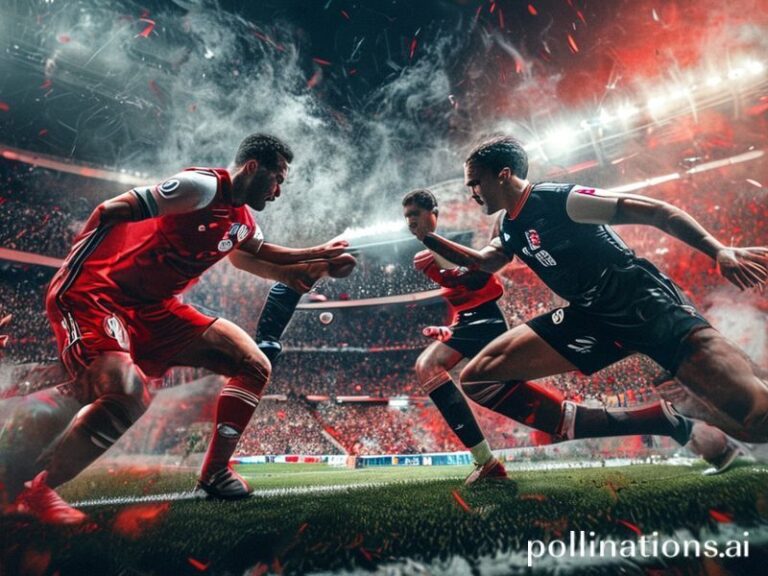AFC North: How America’s Rust Belt Turned Economic Despair into a $15 Billion Entertainment Empire
**The AFC North: Where Civilization Goes to Die (and Somehow Be Reborn)**
*Dispatch from the Rust Belt’s Gladiator Circus*
International observers often ask me to explain American football’s peculiar appeal. I tell them to imagine if the Roman Colosseum had beer commercials, and the lions occasionally unionized. Nowhere is this more apparent than the AFC North, a division where four cities have weaponized seasonal depression into a multibillion-dollar entertainment complex that somehow convinces grown men to paint their faces in sub-zero temperatures.
The division—comprising Pittsburgh, Baltimore, Cincinnati, and Cleveland—represents America’s industrial heartland, which is international diplomat-speak for “places where the American Dream went to die, then got reincarnated as a sports franchise.” These cities once built the steel that framed the world’s skyscrapers; now they export something far more valuable: the comforting illusion that tribal loyalty can fill the void left by deindustrialization.
From a global perspective, the AFC North operates as a fascinating case study in managed decline. While China builds entire cities from scratch, these franchises have mastered the art of monetizing nostalgia for an America that no longer exists. The Pittsburgh Steelers—named after a defunct industry—sell $280 jerseys to fans who haven’t seen a steel mill paycheck in three generations. It’s capitalism’s greatest magic trick: transforming economic anxiety into $12 stadium beers.
The division’s international significance lies in its export of American soft power. Premier League fans in London pubs debate whether Lamar Jackson could succeed in “proper football” (he couldn’t; the man thrives on a level of organized chaos that would give European coaches aneurysms). Meanwhile, German engineers analyze the Browns’ offensive line with the same grim fascination they reserve for American healthcare statistics—technically impressive, existentially horrifying.
What makes the AFC North particularly instructive for foreign observers is its pure distillation of American exceptionalism’s darker currents. This is where “taking a knee” became a national crisis, where concussions are treated with the same scientific rigor as medieval bloodletting, where grown adults genuinely believe that wearing a cheese-shaped hat influences athletic performance. It’s democracy’s id unleashed, complete with face paint and alcohol poisoning.
The division’s rivalries offer anthropological insights into America’s peculiar talent for manufacturing conflict where none exists. Steelers-Ravens games feature two cities separated by 250 miles of interstate that have convinced themselves they’re mortal enemies because of some largely imaginary historical grievances. It’s like watching Brexit, but with better uniforms and clearer rules.
Yet beneath the manufactured drama lies something almost touching: communities that have lost everything—jobs, population, relevance—clinging to the one thing that can’t be outsourced to Mexico or automated by robots. When 70,000 people pack Cleveland’s stadium, they’re not watching football; they’re participating in a massive group therapy session disguised as sport. The fact that the therapy costs $150 per session and includes a $40 parking fee is merely a tribute to American efficiency.
As the world grapples with climate change, rising authoritarianism, and the collapse of the post-war order, the AFC North soldiers on, a $15 billion monument to the proposition that bread and circuses work better when you skip the bread. These franchises have achieved what no international development program could: convincing people that 3-7 hours of weekly entertainment justifies decades of emotional investment, financial sacrifice, and liver damage.
In the end, perhaps that’s the most American thing of all—the audacious belief that happiness can be purchased, one overpriced ticket at a time, even as everything else crumbles around you. The rest of the world watches, equal parts horrified and envious, understanding that we’re witnessing not just football, but the birth of a new global religion. The sacraments are beer and nachos. The heaven is a Super Bowl that never quite arrives. The hell is Cleveland.







